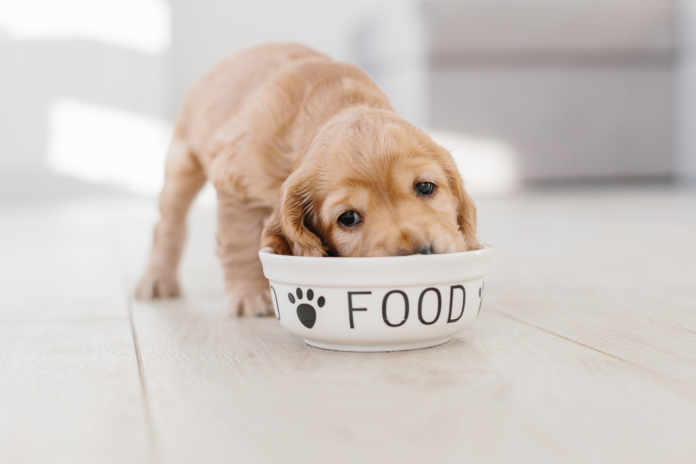Bringing home a new puppy is an exciting experience, but ensuring they receive proper nutrition is crucial for their growth and development. In this article, we’ll explore everything you need to know about puppy food, including nutritional requirements, types of puppy food, and how to choose the best diet for your furry friend.
Understanding Puppy Food
Puppies have unique nutritional needs compared to adult dogs, requiring a diet that supports their rapid growth and development. Puppy food is specially formulated to provide the essential nutrients puppies need during this critical stage of their lives.
Nutritional Requirements for Puppies
Protein
Protein is fundamental for building solid muscles, tissues, and organs in developing little dogs. High-quality animal protein sources, such as chicken, beef, and fish, are commonly found in puppy food formulations.
Fats
Fats are a concentrated source of energy that help support brain development and provide essential fatty acids for healthy skin and coat. Look for puppy food with moderate levels of healthy fats from sources like chicken fat and fish oil.
Carbohydrates
Carbohydrates provide a source of energy and fiber for puppies, aiding in digestion and nutrient absorption. Whole grains like brown rice and oats are often included in puppy food formulations to provide a balanced source of carbohydrates.
Types of Puppy Food
Dry Puppy Food
Dry puppy food, also known as kibble, is a convenient and economical option for feeding puppies. It contains low moisture content and helps promote dental health by reducing plaque and tartar buildup.
Wet Puppy Food
Wet puppy food, available in cans or pouches, is higher in moisture content and can be more palatable for picky eaters. It provides hydration and may be preferred by puppies with dental issues or older dogs with reduced appetite.
Raw Puppy Food
Raw puppy food consists of uncooked meats, bones, fruits, and vegetables, mimicking the natural diet of wild dogs. While controversial, some pet owners believe raw food diets offer superior nutrition and health benefits for puppies.
Choosing the Right Puppy Food

Consider Age and Breed
Puppy food formulations vary based on factors such as age, breed size, and activity level. Choose a puppy food formula specifically tailored to your puppy’s age and breed to ensure they receive the appropriate balance of nutrients.
Quality Ingredients
When selecting puppy food, prioritize quality ingredients and avoid artificial additives, fillers, and by-products. Look for labels that indicate a complete and balanced diet formulated to meet the nutritional needs of growing puppies.
Consulting with a Veterinarian
Consulting with a veterinarian is essential for determining the best diet for your puppy based on their individual health needs and dietary preferences. Your veterinarian can recommend specific brands and formulations that align with your puppy’s nutritional requirements.
Transitioning to Adult Dog Food
Gradual Transition
As puppies grow and mature, their nutritional needs change, necessitating a transition to adult dog food. Gradually introduce adult dog food into your puppy’s diet for several days to minimize digestive upset.
Monitoring for Allergic Reactions
During the transition to adult dog food, monitor your puppy for any signs of allergic reactions or digestive issues, such as diarrhea or vomiting. Assuming unfriendly responses happen, talk with your veterinarian for direction.
Common Mistakes in Feeding Puppies
Overfeeding
Overfeeding puppies can lead to obesity and health problems later in life. Follow feeding guidelines provided by the manufacturer or your veterinarian and avoid free-feeding to maintain a healthy weight.
Inadequate Hydration
Puppies have higher water requirements than adult dogs and may become dehydrated more quickly. Ensure your puppy has access to fresh, clean water at all times to prevent dehydration and promote overall health.
Ignoring Dietary Restrictions
If your puppy has food allergies or dietary restrictions, it’s essential to carefully read labels and avoid ingredients that may trigger adverse reactions. Work with your veterinarian to identify suitable alternatives and create a customized feeding plan.
Homemade Puppy Food
Benefits and Risks
Homemade puppy food offers the opportunity to control the quality and variety of ingredients in your puppy’s diet. However, it’s essential to ensure homemade meals are nutritionally balanced and meet your puppy’s specific dietary needs.
Recipes and Guidelines
If you choose to feed your puppy homemade food, consult with a veterinary nutritionist or use reputable recipes formulated for puppies to ensure balanced nutrition. Incorporate a variety of lean proteins, healthy fats, and carbohydrates to meet your puppy’s nutritional requirements.
Conclusion
In conclusion, providing proper nutrition is essential for supporting the health and well-being of growing puppies. By understanding the nutritional requirements of puppies, choosing the right puppy food, and avoiding common feeding mistakes, you can ensure your furry friend receives the best start in life.
Unique FAQs:
-
How often should I feed my puppy?
- Puppies typically require multiple small meals throughout the day to support their rapid growth and metabolism. Follow feeding guidelines provided by the manufacturer or consult with your veterinarian for personalized recommendations.
-
What should I do if my puppy refuses to eat?
- If your puppy refuses to eat, try offering a different flavor or type of food, ensuring it’s fresh and palatable. If refusal persists, consult with your veterinarian to rule out any underlying health issues.
-
Can I mix different types of puppy food?
- Mixing different types of puppy food, such as dry kibble and wet food, can provide variety and additional nutrients in your puppy’s diet. However, ensure the combined diet meets your puppy’s nutritional needs and monitor for any adverse reactions.
-
When would it be advisable for me to change my pup from pup food to grown-up canine food?
- Puppies typically transition to adult dog food between 12 to 18 months of age, depending on their breed size and growth rate. Consult with your veterinarian for personalized recommendations based on your puppy’s individual needs.
-
Is it safe to feed my puppy raw food?
- Raw food diets can be controversial and may pose risks of bacterial contamination and nutritional imbalances. If you choose to feed your puppy raw food, ensure it’s properly prepared and consult with your veterinarian for guidance on balanced nutrition.

